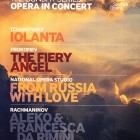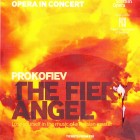Fiery Angel 2017Scottish Opera
Read more about the opera Fiery Angel
Angel makes huge impact
Prokofiev's The Fiery Angel offered the prospect of a powerful dramatic finale to the first half of Scottish Opera's 2017-18 season. The massive forces and impressive cast needed for this work seemed likely to prove a real December tonic, and so it proved.
The Fiery Angel had only been seen in Scotland once before, at the 1970 Edinburgh Festival, in an edition of the score that was significantly abbreviated. That version came in for much criticism from the few enthusiasts then familiar with the piece. It was therefore a very special treat to experience a performance of the complete text of the work.
It also provided another vindication of offering the Sunday series of opera rarities in concert form, adding welcome range and depth to the nation's opera programming. Following last year's successes, the new theme for 2017-18 was unfamiliar Russian operas - Tchaikovsky's Iolanta, Prokofiev's Fiery Angel and a Rachmaninov double bill - Aleko and Francesca da Rimini. The fourth of these concerts (third in date order) is a digest of Russian pieces performed by students from the National Opera Studio under the title From Russia With Love.
Collaborative underpinning
This large scale Fiery Angel production also represented the latest step forward in important collaboration between independent groupings and institutions. A few years ago, the Conservatoire in Glasgow had staged a series of generally excellent productions of Prokofiev operas, again in collaboration with Scottish Opera, who provided the orchestra and much of the technical assistance. The Love for Three Oranges, Betrothal in a Monastery and even War and Peace were tackled head on with great success. But the leading roles in The Fiery Angel are physically and dramatically highly demanding - simply not parts that students should be expected to cope with. This concert saw them take some of the supporting roles.
As with the previous Prokofiev stagings, the large orchestra was swelled by students from the RCS. The Conservatoire also provided the chorus required for the overwhelmingly dramatic final scene. For the main roles, a team of Russian-speaking guests came in, generally with previous experience of their parts. The many short solo roles were taken by students or recent alumni of the RCS.
Memorable performance
Concert performances of operatic works are a very different animal from the fully staged versions. Nevertheless they have their own attractions. These Sunday afternoon events have so far been highly successful at involving the audience in the various dramas, even without scenery or costumes.
This meaty tragedy was even more of a challenge, and the Theatre Royal stage was too small to accommodate the expanded orchestra, necessitating a move to the City Halls.
Any fear that this might have reduced the impact of the performance was set aside within minutes of the start. Conductor Mikhail Agrest, another student of the great Ilya Musin, kept everything tightly controlled, with the orchestra building a great head of steam during the second act interlude and the following scene in Agrippa's laboratory. The pile-driving tension continued after the interval, released briefly by the comic scene for Mephistopheles and Faust before the hair-raising climax took over.
Gripping singing
As with the previous 'concerts', the soloists all knew their parts by heart and acted everything with complete conviction, using the entire hall, not just the stage, to make their dramatic effects. The direction by Max Hoehn followed the composer's stage instructions meticulously, and, with supertitles to translate the Russian, the audience were kept gripped from the opening bars.
The afternoon was rightly dominated by the superb performance of Renata by Svetlana Sozdateleva, who has already sung this astonishingly demanding role in several continental houses. She seemed absolutely tireless and completely involved in the drama. What was even more amazing was how beautifully she sang the part. It is certainly to be hoped that Scottish Opera can bring her back soon. Evez Abdulla also made a highly positive impression as Ruprecht. His incisive baritone projected well from every part of the hall (he moved around a lot) and he also acted as if he were in a completely normal performance - if anything about this amazing opera could be described as normal.
The most impressive of the remaining guests was perhaps tenor Dmitry Golovnin as the magician-philosopher Agrippa. The part lies high and has to ride massive outbursts of sound from the orchestra as the second act climaxes. The two mezzos were also highly effective - Agnieszka Rehlis as the Fortune-Teller frightened by the force of her own predictions and Maria Maksakova doubling as Innkeeper and Abbess.
Bass Alexei Tanovitski displayed a beautiful velvety tone as the Inquisitor, without quite projecting the dominant character the man needs to seize control amid the mass hysteria of the final scene.
Of the local soloists, Luke Sinclair made an excellent impression, relishing a frighteningly comic or comically frightening reading of Mephistopheles. He sang strongly (in a part sometimes taken by the same tenor cast as Agrippa) and had great fun on his return from supposedly eating the waiter, gleefully licking the silver salver as though Salome were being played for laughs. Jerome Knox had less to do as Faust, but still made an effect, Mark Nathan also made his mark near the start, as the first of the students to put in an appearance. But all the young singers did well, projecting clearly in idiomatic Russian.
Few of the audience can have come across this hugely ambitious opera before, but from the enthusiastic reaction it was abundantly clear that The Fiery Angel made a very worthwhile discovery. All concerned should be congratulated.
Performance Cast
- Ruprecht a knight
- Hostess at the inn
- Renata a woman loved by Ruprecht
- Potboy at the inn
- Fortune Teller
- Jakob Glock a bookseller
- Agrippa von Nettesheim a philosopher and magician
- First Skeleton
- Second Skeleton
- Third Skeleton
- Mathias Wissmann Ruprecht's old university friend
- Doctor
- Johann Faust Doctor of Philosophy and Medecine
- Mephistopheles
- Innkeeper at Cologne
- Boy a waiter
- First Neighbour
- Second Neighbour
- Third Neighbour
- Abbess
- Inquisitor
- First Nun
- Second Nun






